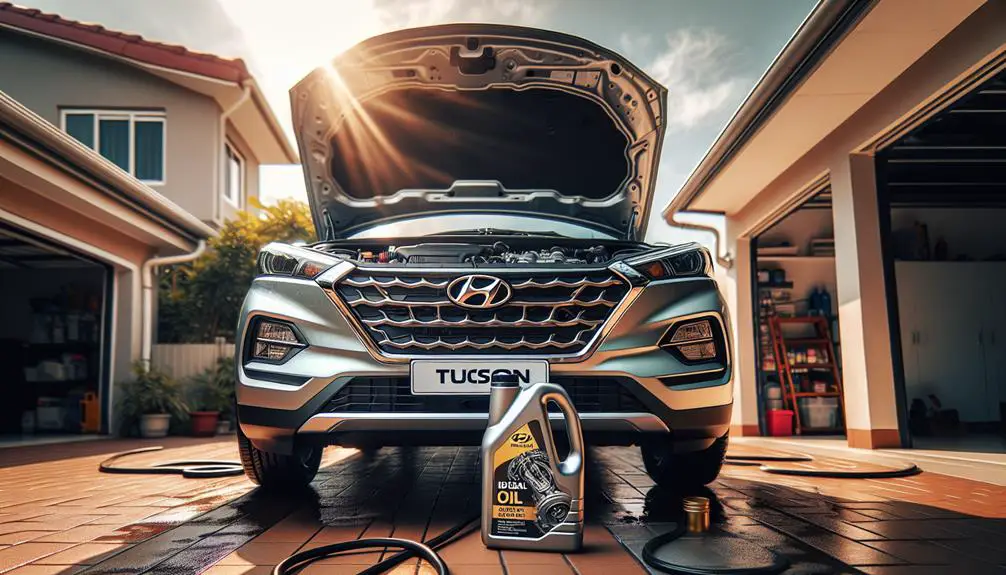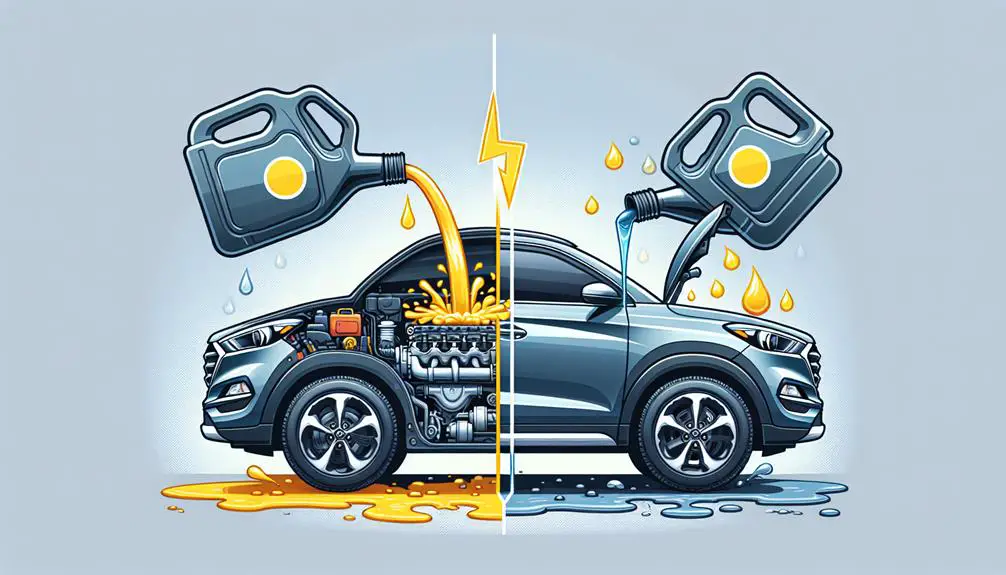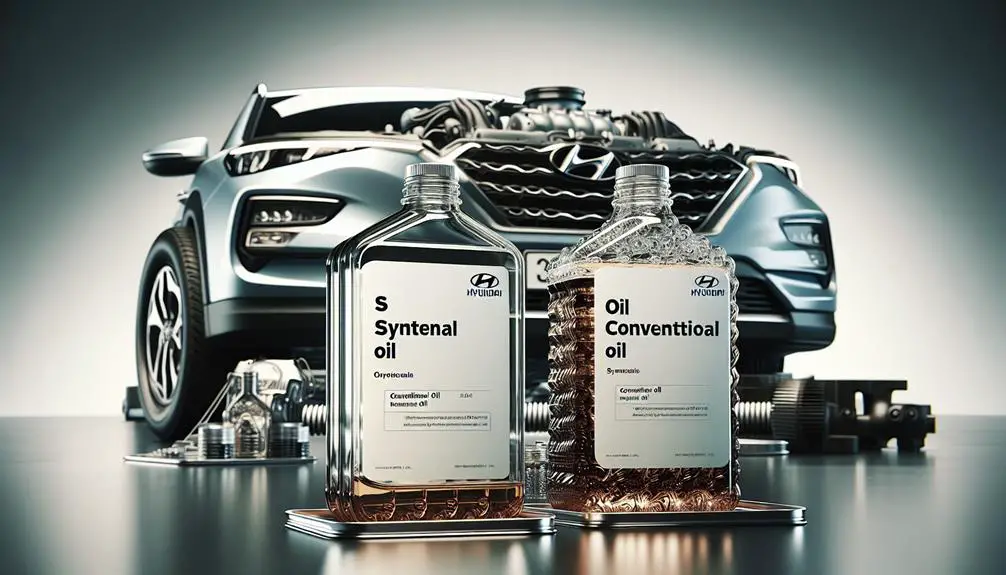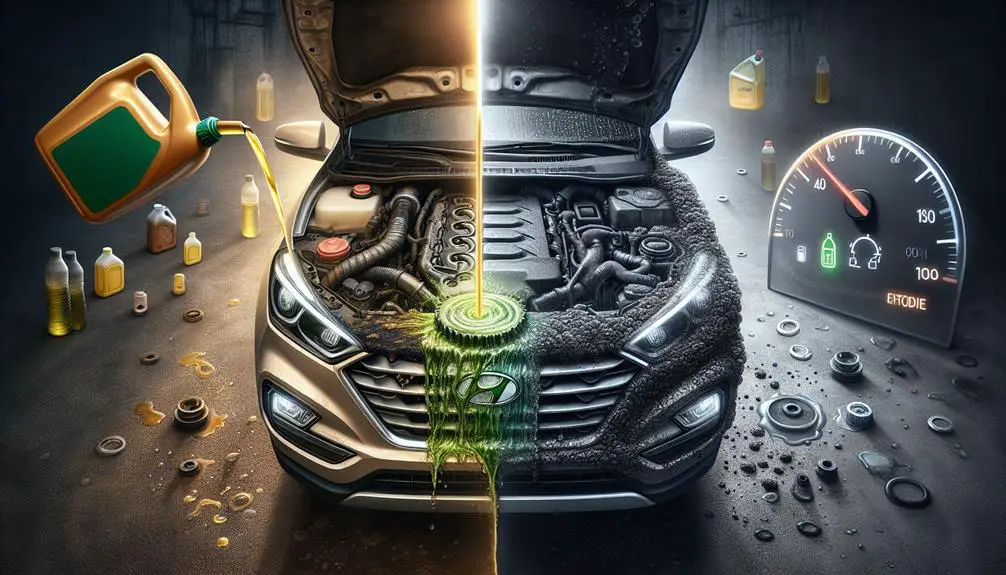Hyundai tucson takes 5w-20 synthetic oil. The recommended oil change interval is every 7,500 miles or 12 months, whichever comes first.
Your Hyundai Tucson needs the right oil to keep its engine running smoothly, just like how a guitar needs the right strings to make good music.
It’s really important to use the correct type of oil to keep your car in good shape.
Knowing the right oil to use is the first step in taking care of your vehicle.
What Type of Oil Does a Hyundai Tucson Need?

Hyundai Tucson takes 5w-20 synthetic oil. The recommended oil change interval is every 7,500 miles or 12 months, whichever comes first.
The Hyundai Tucson needs synthetic oil for optimal performance. Different models may require different oil types, so it’s important to check your specific vehicle’s requirements.
Recommended oil types for different Hyundai Tucson models
Choosing the right oil for your Hyundai Tucson is really important to keep the engine running smoothly. The type of oil you need depends on the year and model of your Tucson.
For newer models like the 2020 and 2021 Hyundai Tucson, it’s best to use synthetic oils like 5W-30 or 5W-20. These oils provide better protection and performance, especially in extreme temperatures.
Older models like the 2010 Hyundai Tucson may need conventional oil with a viscosity of 10W-30. It’s important to check your owner’s manual or ask a mechanic to find out the exact type and viscosity of oil your Tucson needs.
Using the right oil will help your engine work well and last longer.
The significance of viscosity ratings and what they mean for your vehicle
To make sure your Hyundai Tucson’s engine works well and lasts long, it’s important to understand viscosity ratings and what they mean for your car’s oil needs.
Viscosity ratings show how the oil flows at different temperatures. The first number measures flow in cold temperatures, and the second number measures flow in hot temperatures. For example, a 5W-30 oil means it flows like a grade 5 in cold temperatures and grade 30 in hot temperatures.
Picking the right viscosity rating is crucial because it directly affects how well your engine gets lubricated and protected. Using the wrong viscosity can cause more wear and lower engine efficiency.
Always check your car’s manual or ask a professional to make sure you’re using the right viscosity oil for your Hyundai Tucson.
Why Is Choosing the Right Oil for Your Hyundai Tucson Important?

The right oil for your Hyundai Tucson is crucial for maintaining engine health and efficiency. Using the wrong oil type can lead to significant consequences. The oil in your vehicle plays a vital role in lubricating the engine’s moving parts, reducing friction, and carrying away heat.
Using the correct oil viscosity and type recommended by Hyundai ensures that these functions are carried out effectively, prolonging the engine’s lifespan and maintaining optimal performance.
When you use the wrong oil for your Hyundai Tucson, it can lead to several detrimental effects on the engine.
For instance, using oil with the incorrect viscosity can result in poor lubrication, increased friction, and inefficient heat dissipation, potentially causing premature wear and tear on the engine components.
Additionally, using the wrong oil type may lead to inadequate protection against corrosion and the buildup of harmful deposits, further compromising the engine’s overall health and efficiency.
Not only can using the wrong oil impact engine performance, but it can also void the vehicle’s warranty.
Hyundai recommends specific oil types and viscosities for a reason, and failure to adhere to these guidelines could result in warranty issues if engine damage occurs.
How Often Should You Change the Oil in Your Hyundai Tucson?

Hyundai recommends changing the oil in your Tucson every 3,000 to 7,500 miles, based on driving conditions and habits.
Factors such as frequent towing, stop-and-go driving, or extreme temperatures may require more frequent oil changes to maintain engine performance and longevity.
Adhering to these guidelines is essential for keeping your Tucson running smoothly.
Factors that might necessitate more frequent oil changes
If you often drive in stop-and-go traffic or in very hot or cold weather, you may need to change the oil in your Hyundai Tucson more often. Stop-and-go driving can wear out the engine faster and make the oil dirty. Short trips can also cause moisture to build up in the oil.
Extreme temperatures can make the oil break down more quickly. If you tow heavy loads or drive in dusty or off-road conditions, you may also need to change the oil more often to keep your Hyundai Tucson’s engine in good shape.
Synthetic vs. Conventional Oil: Which Is Better for Your Hyundai Tucson?

When it comes to choosing the right oil for your Hyundai Tucson, it’s important to weigh the pros and cons of synthetic and conventional options.
To help you make an informed decision, consider the specific needs of your vehicle and your driving habits.
Below, you’ll find a comparison of the two types to guide you in selecting the best oil for your Hyundai Tucson.
| Synthetic Oil | Conventional Oil |
|---|---|
| Provides better engine protection | More affordable |
| Resists breakdown and sludge buildup | Widely available |
| Performs well in extreme temperatures | Suitable for older vehicles |
This table provides a quick overview of the key differences between synthetic and conventional oil, helping you evaluate which type may be more suitable for your Hyundai Tucson.
Pros and cons of each type in the context of Hyundai Tucson
When it comes to Hyundai Tucson, synthetic and conventional oils have their own advantages and disadvantages.
Synthetic oil provides better engine protection, performs well in extreme temperatures, and allows for longer intervals between oil changes. However, it’s more expensive.
On the other hand, conventional oil is cheaper and suitable for older car models, but it needs to be changed more often and may not provide the same level of engine protection as synthetic oil.
Here’s a comparison to help you understand the pros and cons of each type for Hyundai Tucson:
Synthetic Oil:
- Pros: Better engine protection, performs well in extreme temperatures, longer intervals between changes
- Cons: More expensive, not suitable for all vehicles
Conventional Oil:
- Pros: More affordable, suitable for older car models
- Cons: Requires more frequent changes, may not offer the same level of engine protection
Knowing these differences can help you choose the right oil based on your driving habits and your car’s needs.
Step-by-Step Guide to Changing Oil in a Hyundai Tucson

Preparing for an oil change: tools and materials needed
Before you start changing the oil in your Hyundai Tucson, make sure you have the right tools and materials.
You’ll need a ratchet and socket set to remove the drain plug and oil filter, an oil pan to catch the old oil, and a funnel to pour in the new oil neatly.
Don’t forget to get the correct type and amount of oil specified in your Hyundai Tucson’s manual, along with a compatible oil filter.
Having all these items ready will give you the confidence to successfully change the oil in your Hyundai Tucson.
Detailed instructions for safely and effectively changing oil
Step 1:
Gather all the necessary tools and materials as mentioned in the previous subtopic.
Step 2:
Position a drain pan underneath the oil pan to catch the old oil.
Step 3:
Using a wrench, unscrew the drain plug and allow the old oil to drain completely.
Step 4:
Remove the old oil filter using an oil filter wrench.
Step 5:
Before installing the new oil filter, lubricate the gasket with a bit of fresh oil.
Step 6:
Hand-tighten the new oil filter in place.
Step 7:
Reinsert the drain plug and tighten it securely once the old oil has finished draining.
Step 8:
Refill the engine with the recommended type and amount of oil specified in your Hyundai Tucson’s manual.
Step 9:
Double-check for any leaks before starting the engine.
Tips for disposing of used oil responsibly
After changing the oil in your Hyundai Tucson, it’s important to dispose of the used oil responsibly. Find a certified recycling center or an authorized oil collection site in your area to drop off the used oil.
This helps to protect the environment and prevents contamination of soil and water. It also ensures that you comply with environmental regulations and contribute to a safer community.
Recycling used oil conserves resources and promotes sustainability by reducing the need for new oil production. By disposing of used oil properly, you set a positive example for others in your community and help foster a culture of environmental responsibility.
Signs That Your Hyundai Tucson Needs an Oil Change

If your Hyundai Tucson’s engine is getting louder or if it’s not performing as well as it used to, it might need an oil change. Regular oil changes are important for keeping your engine healthy. Here are some signs that it’s time for an oil change:
- Loud Engine: If your engine is making more noise than usual, it could be because the oil is old and not lubricating the moving parts properly.
- Decreased Performance: If you feel like your car isn’t as powerful or fast as before, it could be because the old, dirty oil isn’t protecting the engine like it should.
- Dirty Oil: Check the oil dipstick. If the oil is dark and gritty, it’s time for a change. Clean oil should be amber in color and smooth.
- Dashboard Warning Light: If the oil change light on the dashboard is on, it’s a clear sign that your Hyundai Tucson needs an oil change.
It’s important to follow the manufacturer’s recommendations for oil changes to keep your Hyundai Tucson running well.
Ignoring the signs of an overdue oil change can damage the engine and lead to expensive repairs.
If you notice any of these signs, it’s time to schedule an oil change to keep your Hyundai Tucson running smoothly.
How to Choose the Right Oil Filter for Your Hyundai Tucson

Step 1: Identify the model and engine specifications of your Hyundai Tucson. This information can usually be found in the owner’s manual or by contacting a Hyundai dealership.
Step 2: Research oil filters that are recommended for Hyundai Tucson models with the same engine specifications as yours. Look for filters that are specifically designed to fit and function optimally with your vehicle.
Step 3: Consider the quality and brand reputation of the oil filters available. Opt for a reputable brand that’s known for producing high-quality filters to ensure proper filtration and engine protection.
Step 4: Check for any additional features or benefits offered by the oil filters, such as enhanced filtration efficiency or extended durability. These features can contribute to better engine performance and longevity.
Step 5: Purchase the oil filter that best matches the recommended criteria for your Hyundai Tucson model and engine specifications. Install the filter according to the manufacturer’s instructions or have it professionally installed to ensure proper fit and function.
Importance of a compatible oil filter
It’s really important to choose the right oil filter for your Hyundai Tucson. A compatible oil filter helps keep your engine running well and lasting longer. It removes impurities and contaminants from the engine oil, which is super important for preventing damage and keeping things running smoothly.
Make sure to pick an oil filter that matches the specifications recommended by Hyundai for your specific Tucson model. Using the wrong oil filter can result in poor filtration, less oil flow, and could even damage your engine. Look for filters that meet or exceed OEM (Original Equipment Manufacturer) standards to ensure they fit and work properly.
Don’t forget to change the oil filter regularly during oil changes to keep your engine healthy and performing well.
Criteria for selecting the best oil filter for Hyundai Tucson models
Selecting the right oil filter for your Hyundai Tucson is really important to keep your engine running smoothly. A good filter should be able to remove dirt and impurities from the oil, so it doesn’t damage the engine.
When choosing an oil filter, it’s important to consider how well it filters, whether it fits your car’s engine, and how long it will last. Here’s a table summarizing what to look for in an oil filter for your Hyundai Tucson:
| Criteria | Description | Importance |
|---|---|---|
| Filtration Efficiency | Ability to trap and hold impurities to keep the engine clean. | High |
| Compatibility | Matching the filter to your Hyundai Tucson’s engine for proper fit and function. | Essential |
| Durability | Longevity and ability to handle different driving conditions and temperatures. | Significant |
The Impact of Oil Quality on Hyundai Tucson’s Fuel Efficiency

Choosing the right oil and maintaining its quality can significantly impact your Hyundai Tucson’s fuel efficiency. By using the recommended oil type and ensuring it’s changed at the right intervals, you can optimize your vehicle’s performance and reduce fuel consumption.
In the upcoming discussion, we’ll provide practical tips for maximizing fuel efficiency through proper oil maintenance.
How oil type and quality can influence fuel consumption
Using high-quality oil in your Hyundai Tucson can make a big difference in how much fuel it uses. The type and quality of oil you use can impact fuel consumption in a few different ways.
High-quality synthetic oils are made to reduce friction and provide better lubrication, which can help the engine work more efficiently and use less fuel. Also, using the right oil thickness for your specific Tucson model can make sure the engine runs as efficiently as possible, which can also improve fuel economy.
It’s important to use the oil type and quality that the manufacturer recommends to get the best fuel efficiency. Changing the oil regularly and using high-quality products can help keep your Hyundai Tucson running efficiently and using fuel in the best way.
Tips for maximizing fuel efficiency through proper oil maintenance
To make sure your Hyundai Tucson uses fuel efficiently, it’s important to use the right kind of oil and take care of it properly. Here are some tips to help you do that:
- Use the oil viscosity that’s recommended for your Tucson’s engine. This will help keep the engine lubricated and reduce friction inside it.
- Check the oil regularly and change it when the manufacturer says to. This will keep the oil working well and prevent the engine from wearing out.
- Use high-quality synthetic oils to improve fuel economy and make the engine last longer.
- Keep the oil level where it should be to avoid using too much oil and keep the engine running well.
Wrapping Up
When it’s time to change the oil in your Hyundai Tucson, make sure to use the right kind and do it on schedule. This will help your car run well and save you money on gas.
Just remember to take care of your Tucson’s oil needs, and your engine will thank you!